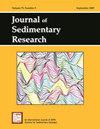坦桑尼亚Rukwa裂谷盆地的古土壤古气候和古环境重建:中新世-上新世动物扩散的意义
IF 2.1
4区 地球科学
Q1 GEOLOGY
引用次数: 0
摘要
东非大裂谷系统记录了现代非洲生态系统进化的一个关键时期,记录了环境变化背景下的重大花卉变化和动物群分散。迄今为止,来自东非的中新世至上新世数据主要来自裂谷东部分支以北的富含化石的裂谷盆地,马拉维裂谷和最近的莫桑比克沿海出现了更有限的窗口。在这里,我们根据对鲁克瓦裂谷盆地古土壤的分析,提供了东非裂谷系西支中新世-上新世过渡的第一批定量古气候数据。坦桑尼亚西南部中新世晚期-上新世早期下湖床序列化石形成的古土壤保留了浅湖环境,形成冲积扇和辫状河系统,并有丰富的泛滥平原沉积物。使用整体地球化学和粘土矿物学进行的古气候重建显示,中新世晚期为高度季节性、半干旱的中新世气候,上新世早期水分可用性增加,导致向亚湿润条件转变。成土碳酸盐的稳定碳同位素组成记录了中新世-上新世过渡时期的林地/灌木丛/灌木林古环境。结果支持了上新世亚湿润到潮湿栖息地的存在,主要是木质植被,为连接东非裂谷系北段和南部非洲的内陆走廊上的动物群提供阴凉、食物和水。本文章由计算机程序翻译,如有差异,请以英文原文为准。
Paleosol-derived paleoclimate and paleoenvironment reconstruction of the Rukwa Rift Basin, Tanzania: implications for faunal dispersal in the Miocene–Pliocene
The East African Rift System records a key interval in the evolution of modern African ecosystems, documenting significant floral changes and faunal dispersals in the context of environmental shifts. To date, Miocene-to-Pliocene data from eastern Africa have been derived primarily from richly fossiliferous rift basins along the far north of the Eastern Branch of the rift, with more limited windows emerging from the Malawi Rift and more recently, coastal Mozambique. Here, we present the first quantitative paleoclimate data for the Miocene–Pliocene transition from the Western Branch of the East African Rift System, based on analyses of paleosols from the Rukwa Rift Basin. Paleosols derived from the fossiliferous late Miocene–early Pliocene lower Lake Beds succession in southwestern Tanzania preserve a shallow lacustrine setting grading into a system of alluvial fans and braided rivers with abundant floodplain deposits. Paleoclimate reconstructions using bulk geochemistry and clay mineralogy reveal a highly seasonal, semiarid, mesic climate during the late Miocene, with increased moisture availability in the early Pliocene resulting in a shift to subhumid conditions. Stable-carbon-isotope composition of pedogenic carbonates document a woodland/bushland/shrubland paleoenvironment across the Miocene–Pliocene transition. Results support the presence of Pliocene subhumid to humid habitats, dominated by woody vegetation offering shade, food, and water for faunal dispersal along an inland corridor connecting northern segments of the East African Rift System with southern Africa.
求助全文
通过发布文献求助,成功后即可免费获取论文全文。
去求助
来源期刊
CiteScore
3.80
自引率
5.00%
发文量
50
审稿时长
3 months
期刊介绍:
The journal is broad and international in scope and welcomes contributions that further the fundamental understanding of sedimentary processes, the origin of sedimentary deposits, the workings of sedimentary systems, and the records of earth history contained within sedimentary rocks.

 求助内容:
求助内容: 应助结果提醒方式:
应助结果提醒方式:


